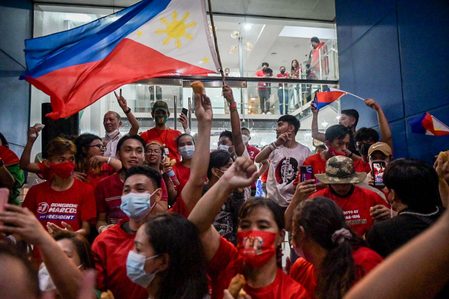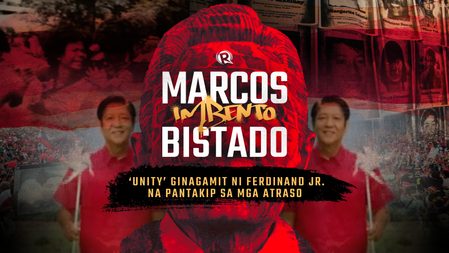SUMMARY
This is AI generated summarization, which may have errors. For context, always refer to the full article.
![[OPINION] The rise of anti-politics: ‘Unity’ in curbing dissent in the Philippines](https://www.rappler.com/tachyon/2022/09/unity-dissent.jpg)
The ascent of Ferdinand “Bongbong” Marcos Jr. to the presidency under a banner of “unity” enjoys the weight of nearly 32 million voters. Questionable or not, these results merit analysis beyond mere accusations of fraud, or this lingering emphasis on the role of trolls and disinformation.
The first thing to note is that Bongbong Marcos deploys a rhetoric of unity, reconciliation, and nostalgia in harnessing public resentment against the EDSA regime. This is in stark contrast to former presidents Joseph Estrada and Rodrigo Duterte who also took advantage of similar sentiments – the former through a platform of pro-poor policies, while the latter through promises of radical change against the status quo.
Furthermore, Marcos Jr. enjoys 15 million more votes than his predecessor without deploying an aggressive rhetoric. Hence, what allows his rhetoric to resonate with more voters in comparison to Duterte even if both appealed to the failure of the EDSA regime and the ideal of autocratic rule?
Analyzing the inaugural and first State of the Nation (SONA) addresses of Marcos Jr., as well as surveying shared political values that have received it, I argue that many Filipinos are resentful of politics itself, and this anti-political tendency is what Marcos Jr. appeals to; that between Marcos and his supporters lies the subtle but equally dangerous threat of anti-politics.
Marcos’ subtle call for ‘unity’ against politics
Before proceeding, the anti-political is the realization of political intolerance by attacking or dismissing political plurality as a threat to unity and government work.
Furthermore, for many, “pamumulitika” (politicking or political gimmicks) and “pinulitika” (roughly translated as politicized) refer to everything dirty, unnecessary, underhanded, and unjust in public affairs. Marcos Jr.’s rhetoric amplifies another dimension of “pamumulitika,” namely, conflating opposition with divisiveness.
Anti-politics entails assertions of loyalty over dissent and opposition, and the dismissal of political discussion as an obstacle to decisive government action. Consequently, dissent without an expression of loyalty and obedience to the leader is mere “pamumulitika” or politicking. Its dismissal, condemnation, and repression can then proceed.
A recent political controversy points to this.
For one, the Commission on the Filipino Language (Komisyon sa Wikang Filipino or KWF) has released a memorandum banning five books from public schools and libraries. The signatories have deemed these works as subversive, anti-Marcos, anti-Duterte, and in violation of Article 9 of the Anti-Terrorism Act of 2020. This ban has since received sharp criticism from academics, legislators, and other government bodies – many of them considering it as repression rearing its ugly head.
Nevertheless, when understood in relation to Marcos’ brand of “well-mannered” unity, this book ban also points to anti-politics; an iron fist with the velvet gloves of reconciliation on one hand, and the mantra of work and action without politics on the other. To illustrate, we turn to Marcos’ inauguration address.
Hopeful and reconciliatory as it may sound, it is premised upon an electoralist condemnation of a supposed “politics of division.” Re-asserting his call for unity, Marcos Jr. states that by “your vote, you rejected the politics of division.” With a sweep, he then absorbs the platforms of his opponents, saying that “I saw little incompatibility with my own ideas about jobs, fair wages, personal safety, and national strength, and ending want in a land of plenty.”
But what is this politics of division?
His own elaboration points to mudslinging. However, from the perspective of his politically intolerant supporters, it can easily refer to opposition itself. This is because they see differing ideas as a threat to social harmony, more so for dissent itself. They also regard public displays of opposition as a nuisance, a disruption to peace and order, or even a threat to government work.
Marcos Jr.’s rejection of this politics of division feeds on widespread political intolerance among Filipinos, and appeals to anti-leftists and anti-communist forces in the Philippines. The latter have grown more vocal since Duterte’s break from his leftist ties, and audacious enough to ban books. More recently, pro-Duterte senator Robin Padilla, a former actor infamous for his awkward flirtations with leftist ideas, asked a school official if they have measures to stop students from becoming leftists and anti-government. This blatant hunt for leftists is just a recent addition to a growing list of rabid pronouncements from government officials and other political figures, as well the violent persecution of suspected members of the communist insurgency.
Pervasive political intolerance and leader worship
Marcos the Younger’s message of unity against this politics of division places the freedoms of speech and organization in an awkward and dangerous position. It compels public expressions to subscribe to the incumbent regime – to the trinity of leader-nation-state as this pervasive fixation on leaders’ dictate. This allows repression to be juxtaposed with expressions of “loyal” dissent.
An example has already occurred with a recent protest by Marcos Jr. supporters over the appointment of Susan Ople as secretary for migrant workers due to concerns over her health. This compliments how police officials have tried to keep the venue of Marcos Jr.’s inauguration exclusive to pro-Marcos “protesters.” However, it’s a contrast to how water cannons have been used against anti-Duterte-Marcos protesters back in May 2022.
So where is the line drawn between these incidents? The answer lies with Marcos’ first SONA.
Avoiding key controversial political issues, Marcos’ first SONA is marked by what it ignores. Problems like historical distortion and human rights violations appear as non-issues for his administration at this point.
When pursued to the hilt, these issues challenge the legitimacy of his regime and those of his predecessors, Duterte and Marcos Sr. For one, the issue of historical distortion is directed at the credibility of claims made on the supposed greatness of Marcos Sr. – something that have served in no small part as a foundation for the younger Marcos’ own legitimacy. The issue of human rights violations, in turn, directly confronts the atrocities committed under his father’s Martial Law and the drug war under Duterte.
With his silence, Marcos Jr. draws the line on issues confronting the legitimacy of his administration. Juxtaposed with persistent persecutions, infighting among citizens in public spaces, and the presence of reactionary forces within and outside the government, his failure to assert political rights becomes an implicit call for an open season against dissent and opposition.
Challenges facing political opposition
The Philippines is turning into anti-political nightmare. It is veiled by seemingly benign claims of focusing on public administration, construed as public service without politics. Behind this, plurality and dissent are either rejected, or worse, made subject to an expressed loyalty to the chief. Dissent becomes taboo.
Politics being perceived as a problem – this is what political opposition must face.
Through this, it appears that Marcos Jr. might be projected and construed by his supporters as the quiet but diligent “victim” of criticism – the supposed embodiment of public administration besieged by politics.
Thus, political opposition must navigate through this danse macabre between persistent and widespread political intolerance, and the anti-political rationale of Marcos Jr. and his administration.
It is now a fight to redefine what politics is and should be along authentically democratic lines. – Rappler.com
Anthony Lawrence Borja is an Assistant Professorial Lecturer in the Department of Political Science and Development Studies in De La Salle University.
Add a comment
How does this make you feel?


![[Rappler’s Best] Welcome to the battlefield](https://www.rappler.com/tachyon/2024/05/maria-ressa-harvard-scaled.jpeg?resize=257%2C257&crop=133px%2C0px%2C1920px%2C1920px)


![[OPINION] Social media and limits of protected speech](https://www.rappler.com/tachyon/2024/04/TL-badoy-red-tagging-2-apr-27-2024.jpg?resize=257%2C257&crop=327px%2C0px%2C720px%2C720px)
![[OPINION] Badoy’s red-tagging and freedom of expression](https://www.rappler.com/tachyon/2024/04/20240426-Badoy-red-tagging-freedom-expression.jpg?resize=257%2C257&crop_strategy=attention)



![[Just Saying] SONA 2024: Some disturbing points](https://www.rappler.com/tachyon/2024/07/TL-marcos-sona-points-july-23-2024.jpg?resize=257%2C257&crop=335px%2C0px%2C720px%2C720px)

There are no comments yet. Add your comment to start the conversation.